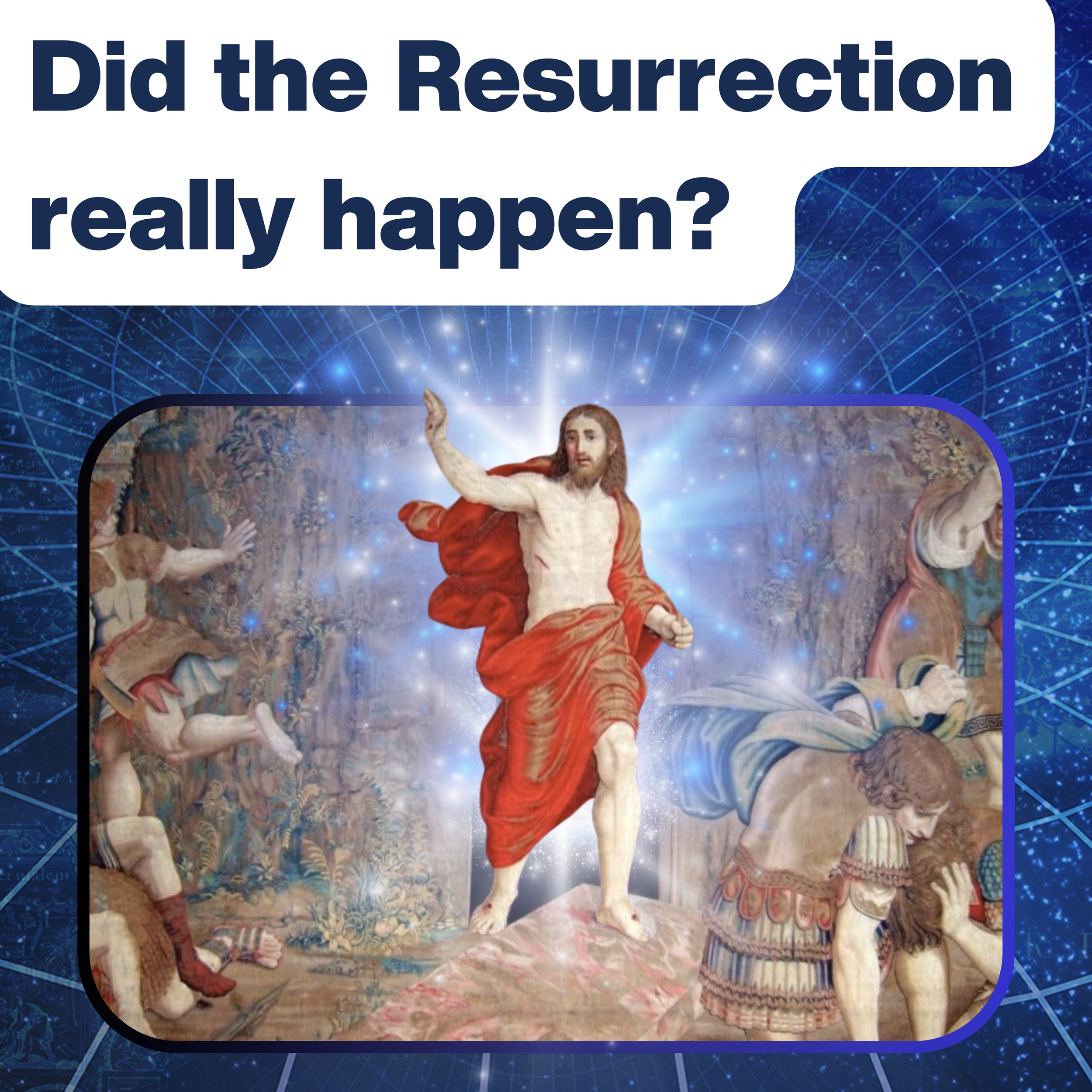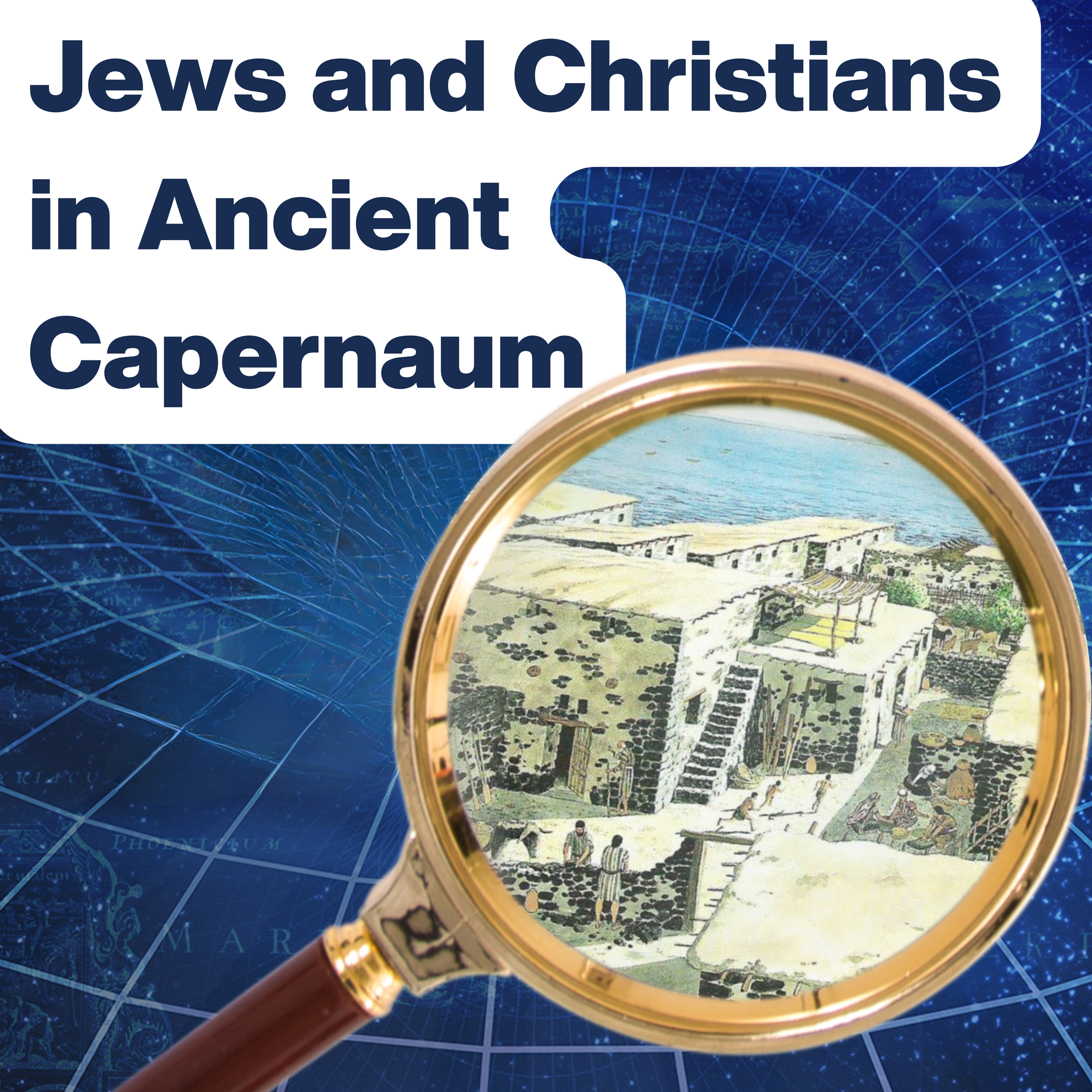
Ep. 72 Body and Blood: The Mysterious Origins of the Eucharist
The Eucharist is such a common part of Christian worship that it's easy to overlook how strange it is — drinking wine that represents Jesus's blood, eating bread that represents His flesh. The ritual would have been even more shocking to Jesus's Jewish followers, for whom consuming blood (even metaphorically) was absolutely forbidden.

Ep. 71 A Crash Course in Biblical History with Dan McClellan
Join Helen and Dave as they attempt the impossible — to cover the entirety of biblical history in one fact-packed episode! To help us, we recruited Dan McClellan from the Data Over Dogma podcast to walk us century by century, book by book through the creation of the Bible. It's like listening to a full season of Biblical Time Machine in one sitting. (In a good way!)

Ep. 70 The History of Prayer from Ancient Judaism to Early Christianity
The "Song of Miriam" is one of the oldest verses in the Hebrew Bible and it's a prayer. What was the nature and role of prayer in ancient Israelite religion? And how can we trace the evolution of prayer into the New Testament period and Jesus's institution of the "Lord's Prayer"?

Ep. 69 Food: What Did They Eat in Ancient Israel?
Finally, Helen and Dave turn to the most important topic of any time period — food! What the heck did regular folks in the Levant eat back in the 12th and 11th centuries BCE? The Hebrew Bible is a lousy recipe book, so we talked to Jacob Damm, an archeologist who specializes in the food and foodways of Ancient Israel. Grab a snack for this one. You're gonna get hungry.

Ep. 68 A Face-Melting Look at the Ark of the Covenant
If Indiana Jones and the Raiders of the Lost Ark is accurate, peering inside the fabled Ark of the Covenant will result in mild to severe face-melting and occasional head exploding. In the Hebrew Bible, the Ark doesn't melt any faces, but it does inflict its fair share of divine violence. Guest Rachelle Gilmour explains the fascinating history and lore behind the Ark of the Covenant.

Ep. 67 The Case for Q, the 'Lost Gospel'
One of the longest-running debates among biblical scholars is over the existence of a hypothetical "lost gospel" called Q. If you compare the synoptic gospels — Mark, Matthew and Luke — there are similarities and differences that can't easily be explained. Was there an even earlier source about Jesus that these gospels were based on? And if so, who wrote it and why was it lost?

Ep. 66 Samson: Hero or Psychopath?
Of all the problematic heroes in the Hebrew Bible, Samson takes first prize. Samson is hailed as a hero of the Israelites — a "Nazirite" consecrated to God with superhuman strength — but he's also a mass murderer, womanizer and all-around menace to society. Helen and Dave welcome Mahri Leonard-Fleckman to the podcast to try to make sense of the wild (and wildly entertaining) Samson cycle.

Ep. 65 Gnosticism and the Nag Hammadi Library Explained
In 1945, dozens of previously unknown Christian texts were discovered near the Egyptian desert town of Nag Hammadi. Some texts were closely tied to the New Testament, like the Gospel of Thomas, but others were pretty wild, portraying the God of the Hebrew Bible as a demon trickster. All of these texts were labeled "gnostic," but scholars continue to debate what "gnostic" really means and what to make of these curious works from the early centuries of Christianity.

Ep. 64 Surgery or Spit? Healthcare in the Ancient World
Countless things could sicken or injure you in the ancient world, so where did people turn for help? Much like today, there were no shortage of healthcare options: herbs, drugs, surgery, saliva — even a literal hole in the head!

Ep. 63 Passover: Did the Exodus Really Happen?
Every Passover, Jewish families gather to recount the miraculous story of Moses leading the Hebrews out of captivity in Egypt. But how much of this age-old tale is true? Helen and Dave welcome Carol Meyers back to the podcast to talk about the limits of Exodus archeology and to put forward some intriguing theories about the historical origins of the Ancient Israelites.

Ep. 62 How Horrible Were Ancient Prisons? LIVE at SBL (Copy)
If you thought everyday life in the 1st century was disgusting, wait until you step inside a Roman prison. In our very first LIVE episode, we talk with Matthew Larsen, historian of ancient incarceration, about the conditions Paul and other early Christians experienced in ancient prisons — nasty food, nastier smells and what it meant to be sent off to the mines.

Ep. 61 Enslaved Christians and the Making of the Bible
In the 1st-century Roman world where Christianity was born, 20% of the population was enslaved. Enslaved people were laborers, farmers, artisans, scribes, teachers, servants and sex workers. And as our guest Candida Moss explains, enslaved people also played a critical role in the spread of Christianity, including the authorship of biblical texts.

Ep. 60 Easter: Behind the Scenes of “The Chosen”
“The Chosen” is a global phenomenon. The streaming series about the life of Jesus is now in its 4th season, which is building toward Jesus’s final week in Jerusalem. Helen and Dave were thrilled to chat with actor Richard Fancy, who plays high priest Caiaphas on “The Chosen.”

Ep. 59 Easter: A Closer Look at the Resurrection
The Resurrection of Jesus is the cornerstone of Christianity, but the reality of the empty tomb is largely a matter of faith, not history. All of the evidence pertaining to the Resurrection is found within the New Testament. So how can anyone definitively prove that the Resurrection did or did not happen?

Ep. 58 Easter: Crucifixion in the Roman Empire
Jesus's mortal life ended on a Roman cross, one of the cruellest execution methods known to man. But how common was crucifixion in the Roman world and how accurate was the New Testament's portrayal of Jesus's agonizing end?

Ep. 57 Capernaum: the Archeology of a Jewish and Christian Village
Capernaum is known as "the Town of Jesus," since so many of Jesus's miracles and preaching happened in this small town on the Sea of Galilee. In the centuries after Jesus's death, Capernaum transformed from a Jewish fishing village into a Christian holy site. Thanks to archeology, we can learn more about Jewish-Christian relations in Capernaum during this much-debated period in the history of the Holy Land.

Ep. 56 Leprosy in the Bible — What Was It?
The history doctor is in! Helen and Dave welcome Dr. Ricky Shinall — an MD with a PhD in biblical studies — to help us diagnose leprosy in the ancient world. Did biblical leprosy have anything to do with modern Hansen's disease? Were lepers considered "untouchable" pariahs? And what does all of this have to do with ritual impurity?

Ep. 55 The Ancient Jews (and Temple) of Elephantine Island
In the 6th Century BCE, on a tiny island in the Nile River, once stood a Temple to Yahweh. Far from Jerusalem, the ancient Jews of Egypt's Elephantine Island worshipped a mighty god they called "Yaho" in one of the first diaspora Jewish communities outside of Palestine. How they got there and who they became is a fascinating and little-known story.

Ep. 54 Who Wrote the King James Bible?
"Thou shalt not" miss this episode about the King James Bible, the most-read literary work in the English language! But who was King James? Why did he order a new English translation of the Bible (there were plenty out there already)? And who were the translators tasked with this monumental project (hint: not Shakespeare)?

Ep. 53 Did Jesus Bless a Same-Sex Relationship?
The New Testament story known as the "Healing of the Centurion's Slave" has been the subject of some intriguing scholarship in recent years. In the Greco-Roman world, the Greek word translated as "slave" or "servant" in the Bible also meant the younger partner in a same-sex male relationship. So the question is: by healing the Centurion's partner, did Jesus effectively bless a same-sex relationship?